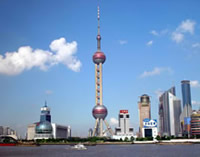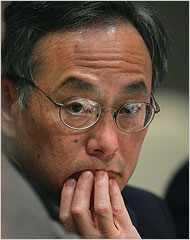|
|


ADVERTISEMENT
Buy Your own advertising
spaces!
.
Download Adobe Acrobat Reader to open [PDF] files.
Recent Visitors
U.S. and China Agree to Study Ways to Make Buildings More Energy-Efficient
2009. 17 July
Mr. Chu said that the United States and China had drafted a memorandum of understanding for creating a team of experts that would study ways to provide heat, air-conditioning and  by KEITH BRADSHER
by KEITH BRADSHER
(nytimes.com)
BEIJING — Ending his first official visit to China, the United States energy secretary, Steven Chu, said the two nations had agreed to plan joint studies on ways to improve the energy efficiency of buildings, a major issue in addressing China’s contribution to climate change.
He spoke after touring an American-built model house with energy-efficient windows, appliances and other features with Chinese officials and the United States commerce secretary, Gary Locke.
Still, both Mr. Chu and Mr. Locke have said that the main purpose of their trip was to build a relationship with their Chinese counterparts, not to forge broad agreements on climate issues or energy policy.
The stakes are nonetheless crucial, given that the two nations are the biggest emitters of the greenhouse gases that contribute to global warming. Mr. Chu and Mr. Locke both said on Thursday afternoon that after speaking with senior Chinese officials, they were confident China shared the desire of the United States to address climate change. “We both recognize it’s a long journey,” Mr. Chu said.
He said that China’s broad effort in areas like renewable energy make it more likely that an agreement can be reached in December at the United Nations climate change conference in Copenhagen. The goal of those talks is to negotiate a global treaty to replace the 1997 Kyoto Protocol, which imposed no emission limits on China or developing countries. The United States never ratified that accord.
After visiting a power plant that also produces central heat for homes, Mr. Chu said, “I am optimistic of what is going to happen in Copenhagen.”
Mr. Locke agreed that “the relationships that were built on this trip will pave the way for progress.”
The Obama administration is hoping that the Senate version of a climate-change and energy bill approved by the House will similarly include rules requiring power companies to use more renewable energy and will introduce a “cap and trade” system to limit carbon-dioxide emissions. Skeptics in Congress have questioned whether China will also act to rein in emissions.
Mr. Locke mentioned that he was particularly impressed that China was building six wind farms of 10,000 to 20,000 megawatts apiece. In Texas, the oil and gas executive T. Boone Pickens just put on hold plans to build a 4,000-megawatt wind farm that had been originally promoted as the world’s largest.
By emphasizing that China is taking action, even as it continues to build a large coal-fired plant each week, Mr. Chu and Mr. Locke might make it more palatable for Congress to consider an agreement from Copenhagen that includes fewer limits on the emissions of developing countries than have been sought. China opposes any such limits.
European officials have fretted that China and the United States might reach their own deal on climate change and then demand that other countries accept it at the Copenhagen conference. Mr. Chu said in an interview on Wednesday that it was possible that the United States and China would conduct bilateral talks to work out their differences on climate policy. Particular concern is focused on how nearly four-fifths of the electricity in China is generated from coal, producing particularly high emissions of carbon dioxide, the main gas that contributes to global warming. Electricity prices in China are low by international standards.
China is also erecting new buildings at a breathtaking pace and now accounts for half the square footage of buildings under construction around the world, Mr. Chu said in Beijing on Wednesday. The Chinese government has started urging developers to install insulated windows and compact fluorescent bulbs.
“If China were to adopt green construction methods, that would result in millions of jobs for the Chinese people,” Mr. Locke said.
Mr. Locke was headed Thursday evening to Shanghai, where ground will be broken for the United States pavilion at the site of World Expo 2010, and will fly back to the United States on Friday.
Mr. Chu will return to the United States on Friday but first will stop in Tianjin, a port near Beijing. The energy secretary, a Nobel laureate in physics, is scheduled to view the papers of his grandfather, who was the dean of Tianjin University in the 1930s.
Source:www.nytimes.com

